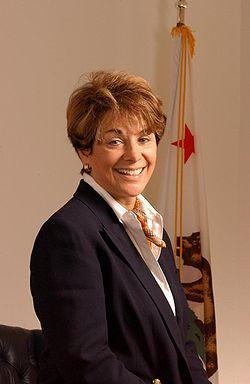
U.S. Representative Anna Eshoo, a California Democrat, introduces a bill to require mobile providers to disclose their 4G speeds.
The U.S. Federal Communications Commission should reclassify broadband as a regulated public utility in order to achieve net neutrality, but take a "light touch" while doing it, a U.S. lawmaker said Wednesday.
The FCC should be selective about what public utility-style regulations it should apply to broadband, Representative Anna Eshoo, a California Democrat, wrote in a letter to the FCC.
FCC Chairman Tom Wheeler, issued a net neutrality proposal in May that would allow "commercially reasonable" traffic management, but would not reclassify broadband. However, that route would not be "adequate to protect free speech, competition and the continued openness of the Internet," Eshoo wrote.
New net neutrality rules "must be based on solid legal ground and provide certainty for consumers and businesses alike," Eshoo wrote.
The FCC should reclassify broadband as a regulated telecommunications service under Title II of the Communications Act, but forbear from applying and enforcing many Title II regulations, Eshoo wrote.
Title II defines telephone companies as common carriers and requires them to deliver service at "just and reasonable" rates and interconnect with each other, among other regulations.
Eshoo's position is similar to one voiced by many advocates of strong net neutrality rules, but it conflicts with the position of large broadband providers Comcast and AT&T, who have called on the FCC to pass basic net neutrality rules without reclassifying broadband.
"After a decade of uncertainty, it's time to protect the open Internet, the economic crown jewel of our country, once and for all," Eshoo wrote.
Verizon Communications, filed a lawsuit to challenge net neutrality rules the FCC passed in 2010, has called on the agency to avoid new regulations. Earlier this year, a U.S. appeals court threw out a large part of the FCC's 2010 rules in response to the Verizon lawsuit.
As the FCC considers new net neutrality rules in the coming months, the agency is getting pressure from all sides.
Eshoo is the second prominent Democratic lawmaker to submit a net neutrality plan based on Title II to the FCC this month. On Oct. 3, Representative Henry Waxman, also from California, called on the FCC to adopt a "hybrid" regulatory approach to net neutrality.
Waxman called on the FCC to reclassify broadband under Title II, then use the separate Section 706 of the Communications Act, a section that directs the agency to encourage broadband deployment, to prohibit broadband providers from blocking or throttling Web content and from charging Web services for paid prioritization.
Wheeler's May net neutrality proposal would be based on Section 706, and broadband providers Comcast and AT&T have agreed with that approach.
Eshoo also called on the FCC to prohibit broadband providers from selectively blocking Web content and to prohibit paid prioritization arrangements. The agency should also require broadband providers to disclose to the public their network management and billing practices, and it should apply the same rules to mobile broadband as it does to wired broadband services, she said.
Still, much of Title II, a section of the Communications Act used to regulate traditional telephone services, would not be necessary to enforce net neutrality rules, she wrote.
"Some have painted Title II as a relic of the past, suggesting that the reclassification of broadband as a common carrier service will curtail investment and tie down the nation's communications providers in heavy-handed regulation," Eshoo wrote. "I do not support heavy-handed regulation and it is not called for."
But claims that Title II "is heavy-handed are simply unfounded," she added. "The commission already has the ability to tailor the law for market circumstances, deciding when and where to forbear from certain rules when those requirements are no longer necessary to protect the public."
Broadband providers and allied groups continue to resist calls for the FCC to reclassify broadband.
Reclassification "remains a non-starter for our industry," Walter McCormick, president of telecom trade group USTelecom, said in a statement after Waxman's proposal.
The FCC doesn't have a history of forbearing from Title II regulations once they are applied, he added. Forbearing from most Title II regulations is "an enormous task that the FCC has never undertaken," he said.
Grant Gross covers technology and telecom policy in the U.S. government for The IDG News Service. Follow Grant on Twitter at GrantGross. Grant's email address is grant_gross@idg.com.
Join the CIO Australia group on LinkedIn. The group is open to CIOs, IT Directors, COOs, CTOs and senior IT managers.
